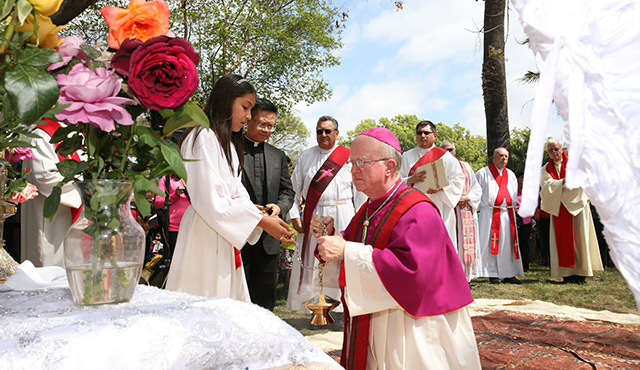It would be interesting if every diocesan office of liturgy were to take a page each year from the book of the Academy of Motion Picture Arts and Sciences and award an Oscar to high-performing parishes in the areas of preaching, presiding, participation and music.
Best preacher, best presider, best participating congregation and best liturgical music in any given diocese deserve recognition, and by recognizing the best, the diocesan office could encourage other parishes to improve.
Gradual improvement across the board in any diocese would make weekend worship more attractive to former parishioners who have drifted away. There should be no difficulty finding or designing an appropriate statuette to accompany the recognition. And instead of calling it an Oscar, the award in this case might be named in honor of a saint or familiar liturgical gesture, item or event that all would recognize. Something like a “thurible” or “prie dieu” might work.
If any creativity at all resides in a diocesan office charged with the promotion of good liturgy, it should not be difficult to set standards and select judges for this holy competition. All parishes would have to be visited over the course of any year by judges who are there only to help, not to police or punish.
Dramatic improvement in the quality of worship is likely to result. And it is also a good probability that positive playback would be felt in the seminaries where future contenders for this recognition are in formation.
If, say, the Sunday morning 11 a.m. liturgy at a given parish were so honored, it is probable that visitors would be attracted, regular attendees would be retained and the disaffected young might be prompted to take a look to see what’s going on. And isn’t this exactly what any parish wants to see happen?
If anything close to this is going to occur, however, pastor and parish staff will have to pay more attention to what is actually taking place on weekends in the parishes where the faith community looks to them for leadership. They might see this as an opportunity to engage young people in the planning and preparation of liturgies. They might invite experienced professionals in the parish to help evaluate the quality of preaching, presiding, participation and music in parish liturgies.
Nothing but good can come from an initiative like this. It won’t happen, however, without diocesan leadership and widespread cooperation from the people in the pews who, I suspect, are just waiting for something like this to happen.

